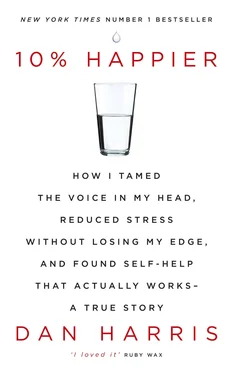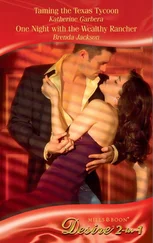I was sitting in Robin’s spot, at a small, satellite anchor desk inside the second story of ABC’s glass-encased studio in New York’s Times Square. On the other side of the room was the main anchor desk, home to the show’s cohosts, the avuncular Charles Gibson and the elegant Diane Sawyer.
Charlie tossed it over to me: “We’re gonna go now to Dan Harris, who’s at the news desk. Dan?” At this point, I was supposed to read a series of six “voice-overs”—short news items, about twenty seconds apiece, over which the control room would roll video clips.
It started out fine. “Good morning, Charlie and Diane. Thank you,” I said in my best morning-anchor voice, chipper, yet authoritative.
But then, right in the middle of the second voice-over, it hit. Out of nowhere, I felt like I was being stabbed in the brain with raw animal fear. A paralytic wave of panic rolled up through my shoulders, over the top of my head, then melted down the front of my face. The universe was collapsing in on me. My heart started to gallop. My mouth dried up. My palms oozed sweat.
I knew I had four more stories to read, an eternity, with no break and no place to hide—no sound bites or pretaped stories or field correspondents to toss to, which would have allowed me to regroup and catch my breath.
As I began the third story, about cholesterol drugs, I was starting to lose my ability to speak, gasping as I waged an internal battle against the wave of howling terror, all of it compounded by the knowledge that the whole debacle was being beamed out live.
You’re on national television.
This is happening now. Right now.
Everyone is seeing this, dude.
Do something. DO something.
I tried to fight through it, with mixed results. The official transcript of the broadcast reflects my descent into incoherence:
“Researchers report people who take cholesterol-lowering drugs called statins for at least five years may also lower their risk for cancer, but it’s too early to . . . to prescribe statins slowly for cancer production.”
It was at this point, shortly after my reference to “cancer production,” with my face drained of blood and contorted with tics, that I knew I had to come up with something drastic to get myself out of the situation.
My on-air meltdown was the direct result of an extended run of mindlessness, a period of time during which I was focused on advancement and adventure, to the detriment of pretty much everything else in my life. It began on March 13, 2000: my first day at ABC News.
I was twenty-eight years old, terrified, and wearing an unfortunate double-breasted suit as I walked through the high-ceilinged entryway lined with pictures of such luminaries as Peter Jennings, Diane Sawyer, and Barbara Walters (all now my colleagues, apparently), then took the steep, stately escalator up into the mouth of the building on Manhattan’s Upper West Side.
They made me go to the basement that day, to some fluorescent-lit security office to have my picture taken for my new identification card. In the photo, I looked so young that a colleague would later joke that a wider shot might reveal me to be holding a balloon.
That I had made it to ABC at all seemed like a big misunderstanding, or maybe a cruel joke. During the preceding seven years, as I toiled in local news, my dream had always been to “get to the network”—which was how people in the farm leagues referred to it—but I had assumed it wouldn’t happen until I was maybe forty and looked old enough to operate a motor vehicle.
I had started in TV news straight out of college, with the vague goal of pursuing a career that had a modicum of glitz and also did not require me to do any math. My parents were doctors, but I didn’t have the aptitude or the attention span for med school. So, despite some initial misgivings on the part of my folks, I took a job at an NBC station in Bangor, Maine (one of the smallest television markets in the country—number 154 out of 210). The gig was part-time, paid $5.50 an hour, and involved writing scripts for the anchorwoman, then operating the studio camera during a broadcast called Alive at 5:30 . On my first day, the producer who was assigned to train me wheeled around from his electric typewriter and matter-of-factly announced, “This is not a glamorous job.” He was right. Covering tire fires and snowstorms in rural Maine—not to mention living in a tiny apartment on the first floor of an elderly woman’s house and eating mac and cheese nearly every night—was profoundly unsexy. Nevertheless, I loved it immediately.
After a few months of badgering my bosses to put me on camera, they relented, and I became a reporter and an anchor, even though I was barely twenty-two and only had one blue blazer, a hand-me-down from my dad. It didn’t take long for me to know that this job was what I would be doing for the rest of my life. I found the craft itself fascinating—especially the challenge of writing stories that were meant to be spoken aloud and matched to pictures. I delighted in the opportunity to get intrigued by an obscure but important subject, and then devise ways to teach viewers something that might be useful or illuminating. Most of all, I took enormous pleasure in the fact that my new position gave me license to march up to important people and ask impertinent questions.
Broadcast news is a tricky beast, though. Aside from the high-minded stuff about holding powerful interests accountable and using the power of the medium for good, there is also something deeply and irrationally affirming about getting your mug on TV. Watch how excited people get at baseball games when their faces flash on the JumboTron. Now imagine doing that for a living.
My colleague in Bangor was correct that much of the actual work of being a TV reporter—sitting through interminable news conferences, spending hours in a news van with an irascible cameraman, chasing down cops for sound bites—was not glamorous, but as I moved to larger markets, first to Portland, Maine, and then to Boston, the pay got better and the stories bigger, and the visceral thrill of being recognized in bars and on line at the bank never got old.
I remember my mother, a repository of wisdom, once telling me offhandedly at some point during my youth that she thought anyone who would run for president must have a hole on their inside that was so big it could never be filled. To the extent that I ever allowed myself to reflect on my drive to be on TV, I always found her comment haunting.
Seven years after that first job in Bangor, I was working at a twenty-four-hour cable news channel in the Boston area when I got a call, seemingly out of nowhere, indicating that I might be on the cusp of landing the big fish. My agent told me that executives at ABC News had seen my tapes and wanted to talk.
They hired me as the co-anchor of ABC’s loose and scrappy overnight newscast, World News Now , which airs from two to four in the morning, to an audience consisting primarily of insomniacs, nursing mothers, and college students hopped up on ADD drugs. By the time I reported for duty, though, on that day in March of 2000, the guy I was supposed to replace, Anderson Cooper, had decided he didn’t want to leave just yet. Not knowing what else to do with me, the bosses gave me a chance to file some stories for the weekend edition of our evening newscast, World News Tonight . As far as I was concerned, this was the coolest thing that had ever happened to me. Just a few weeks prior, I’d been reporting for an audience of tens of thousands of New Englanders; now I was broadcasting to millions of people all over the country. Then it got even better: I was asked to file my first story for the weekday edition of the evening news, anchored by Peter Jennings himself.
Читать дальше












